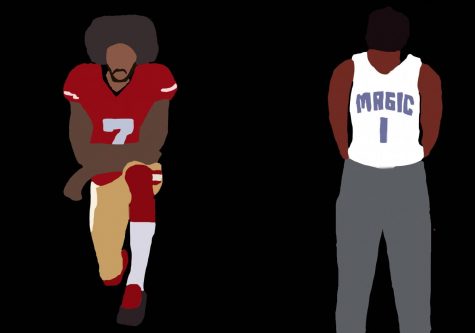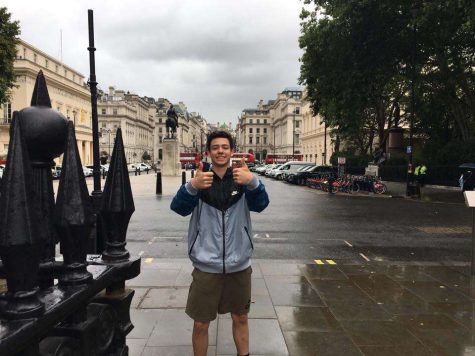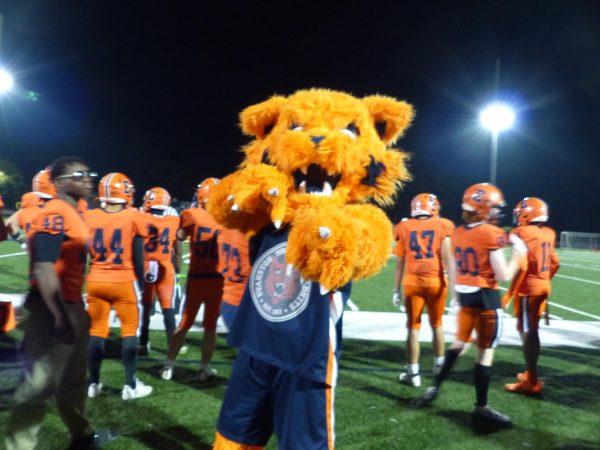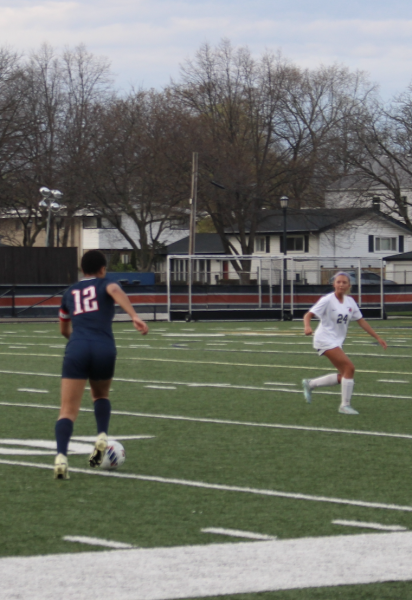Bubble: popped
September 24, 2020
On August 26, 2020, the Milwaukee Bucks refused to play in their playoff match-up against the Orlando Magic, bringing attention to the racial injustices in America.
The wildcat strike, which was in response to the police shooting of Jacob Blake, an ETHS graduate, in Kenosha, WI, caused every other NBA team to halt playoff games for the next three days. This strike came four years after former San Francisco 49ers player Colin Kaepernick started kneeling before his games to protest police violence against Black Americans. At the time, Kaepernick stirred up conversation regarding the validity of athletes using their voices for protest. Kaepernick Inspired many other athletes across all sports to kneel before their games. These actions brought major awareness to the problems of racial injustice in America to many other sports.
After the incident with Colin Kaeprnick and kneeling during the national anthem, many people were outraged and criticised him, telling him he was disrespecting the meaning of the American flag and the national anthem. while he was being criticised, he emphasized that his purpose was not to disrespect anyone, but to bring awareness to the ongoing racial problems in America.
Protesting athletes can be traced back as early as the 1960s, when NBA Legend Bill Russell along with 4 of his other Black teammates protested the racial injustices in America and the segregation they experienced as members of a majority white league. Even during the recent protests, Bill Russell spoke out regarding the murders of George Floyd and Breonna Taylor demanding justice for both of them and addressed the racial inequalities and prejudicial murders committed by police officers across America.
“Yes, nothing had changed & we will see some change but most likely not enough,” Russell tweeted after attending a protest after the murder of Floyd back in June.
However, as time progressed more athletes began using their voices demanding change in their communities as well as addressing the political stage in America. In 2018, Fox News anchor Laura Ingraham infamously told NBA stars LeBron James and Kevin Durant to “Shut up and dribble” after they criticized President Trump and addressed their treatment as Black Americans in an interview with ESPN’s Cari Champion.
Alongside the NBA’s efforts, it is important to recognize the work the WNBA is doing towards social justice led by the members of the Atlanta Dream, WNBA players began wearing T-shirts supporting a political opponent of Kelly Loeffler, a US senator and co-owner of the Dream, who has spoken against the Black Lives Matter movement publicly. As a collective, players of every WNBA team wore shirts saying “Vote Warnock” in support of Rev. Raphael Warnock, the challenger of Loeffler’s seat.
Outside of demanding support from Warnock, WNBA players also showed solidarity with Jacob Blake by coming on the court wearing shirts spelling out his name along with seven “Bullet holes” on the backside of their shirts representing the shots Blake endured.
Through all other major US sports, there were different types of support and vocal activism. In the NHL, a league which is predominantly white, the Minnesota Wild’s Matt Dumba advocated for the Black Lives Matter organization and asked for the support of his fellow players and helped the league make strides towards becoming anti-racist.
This does however go outside of just professional sports. The NCAA announced in June that they would be blocking all championship and regional playoff games in states “Where [the Confederate Flag] has a prominent presence,” per their official release.
In an official statement, NCAA Board of Governors Chair Michael V. Drake added, “There is no place in college athletics or the world for symbols or acts of discrimination and oppression.”
Many of these colleges, primarily in the south, have certain areas on campus named after prominent pro-slavery politicians and generals. The Honors College at the University of Clemson in South Carolina was named after John C. Calhoun, who was a preeminent proponent of Slavery and the Antebellum South in America. This idolization of him in the form of him being the namesake of the college led to many current and former students at Clemson to demand the name be changed to remove the racist connotations. These protests were led in part by current athletes at the school and backed up by former athletes at the same schools.
Locally, the ETHS boys basketball team painted “Black Lives Matter” across Dodge street in front of the main entrance to the building in solidarity with the Black Lives Matter movement.
“It was initially organized by four players, and our coach was in full support of it, and we got the City of Evanston in on it and got some art department to give us supplies and help us too,” senior Logan Talmage said.
As social justice remains at the forefront of many discussions today in society, it is vital that we encourage and enable athletes to use their voices and speak out in support of those who are oppressed and allow them to lead dialogue that can help spark important changes in our communities.















